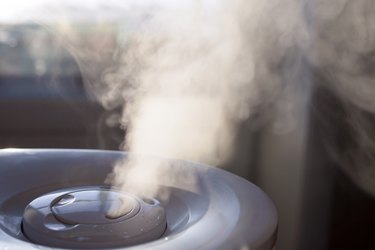
Snoring is kind of like having food on your face. You may not even realize it's there, but the people around you do (think: your bed partner). It can also be a little embarrassing, and once it's brought to your attention, you probably want it gone.
Here's the thing: Almost half of adults snore occasionally, and a quarter saw wood regularly, according to Johns Hopkins Medicine. Luckily, there are things that help.
Video of the Day
Video of the Day
Read on for the best snoring remedies from sleep specialists.
Real Quick: Why Do People Snore?
“People snore when the movement of air creates vibration somewhere in the breathing pathway (throat, tongue, nasal passages),” Chris Winter, MD, neurologist, sleep specialist and author of The Sleep Solution, tells LIVESTRONG.com. “When airway tissue is loose or relaxed, it can vibrate, producing a sound.”
Some people snore because they have a deviated septum (when the wall between your nasal passages is off-center), which can be surgically corrected. For others, the problem might be weight gain or age.
“As we age and gravity pulls on our bodies, it's not just the outer parts of our bodies that sag,” Dr. Winter says. “As our airway sags, there is more of a chance of snoring developing.”
1. Try Sleeping on Your Side
"Most of us are more likely to snore when we are laying on our backs," Terrell Smith, MD, MPH, director of clinical development at Spora Health, tells LIVESTRONG.com. "When you lay on your back, you could be poorly aligning the neck, which could lead to blockage of air movement, thus the snoring."
Sleeping on your side instead may be an easy way to stop snoring immediately. If snoozing in that position doesn't come naturally, try the MedCline Wedge and Body Pillow System, which can help you get comfortable on your side and stay there during the night.
Buy it: MedCline Wedge and Body Pillow System ($269.99, Amazon.com.com)
2. Drink Water

There's nothing you can drink to magically cure snoring, but getting more H2O in general may help cut down on the noise.
"Drinking water before bed can help keep your nasal and throat passages from drying out, which makes snoring more likely," Dr. Smith says.
Being hydrated can help you achieve deeper REM levels and better sleep quality in general, so you'll feel more well-rested the next day, he adds.
Tip
A good general guideline for staying hydrated is to drink half your body weight in ounces of H2O each day. So for example, if you weigh 180 pounds, you should aim to drink 90 ounces of water, or about 11 cups.
3. Limit Alcohol
"Avoiding excessive amounts of alcohol is key," Dr. Smith says. "Alcohol can cause dry mouth and less functional control of your body to keep the airways open."That is, alcohol relaxes the muscles in your mouth and throat, making in harder to keep the airway open, which can lead to snoring.
Drinking alcohol before bed affects your sleep quality in many other negative ways as well, such as decreasing REM sleep and causing you to wake up several times during the night.
The Centers for Disease Control and Prevention recommends people assigned male at birth drink no more than two alcoholic drinks each day, while people assigned female at birth should stick to one or fewer. And the further from bedtime you imbibe, the less chance those drinks will lead to snoring.
4. Avoid Certain Foods

"For some, reducing dairy and spicy foods before bed can help," Dr. Smith says.
If you're sensitive to lactose and don't know it, eating dairy can cause the nasal passages to swell, while spicy food can have an inflammatory effect on your throat. Both can contribute to snoring.
According to the Cleveland Clinic, foods that contain high levels of lactose include:
- 1/2 cup milk (whole, reduced fat, fat-free, buttermilk and goat's milk)
- 1/4 cup evaporated milk
- 2 oz. cheese spread or soft cheeses
- 3/4 cup cottage cheese
- 3/4 cup ricotta cheese
- 1/2 cup yogurt, plain
- 3/4 cup ice cream
- 1/2 cup heavy cream
- 2 tbsp. nonfat dry milk powder
5. Get to a Healthy Weight
"Weight loss in general can be very helpful," Dr. Winter says. That's because extra fat tissue in the neck and throat can narrow the airways, causing you to snore. Losing weight can open up those airways and get rid of snoring naturally.
Keep in mind that weight loss should be a gradual process that involves making healthy, sustainable lifestyle changes, including eating nutritious foods and getting regular exercise. Avoid fad diets that promise quick results, and stay away from detoxes, cleanses or any extreme eating plans that cut calories too low or nix entire food groups.
Ready to Lose Weight?
Set yourself up for success with LIVESTRONG.com's Weight-Loss Kickstart program.
6. Try Nasal Strips
"Nasal strips can work for some," Dr. Winter says, but it depends on the source of the snoring. Noisy nighttime breathing that stems from relaxed tissue in the back of the airway would not be affected by something placed over or in your nose, he says.
However, nasal strips may be an effective over-the-counter snoring remedy for people who snore due to allergies or inflammation, Dr. Smith notes. They're fairly inexpensive, so if you're not sure why you snore, these may be a remedy worth trying.
Buy it: Breathe Right Lavender-Scented Nasal Strips ($7.79 for 10, Amazon.com)
7. Ease Congestion

If you're snoring because of congestion due to allergies or illness, some over-the-counter remedies can help you breathe easier. One is running a humidifier in your bedroom at night, which can help soothe inflamed airways and relieve stuffiness, according to the National Library of Medicine. (Psst: Check out LIVESTRONG.com's guide to the best humidifiers out there.)
Another is Vicks VapoRub ($6.99 for 2, Amazon.com) which, when rubbed on the chest, can open up nasal passages and may help ease snoring.
8. Wear a Mouthpiece
"If you have sleep apnea, the use of a mouthpiece can reduce snoring by 25 to 50 percent," Dr. Smith says. "With your doctor's approval, it might be worth a trip to your dentist's office to get an anti-snoring dental device."
Keep in mind that while they can be very effective for snoring, these devices are often expensive (think: several hundred dollars). If you're on a budget, you could try an over-the-counter anti-snoring mouthpiece to see if it makes a difference for you. These devices are designed to open the airway and hold the jaw and tongue in a position that's meant to improve breathing.
Buy it: VitalSleep Anti-Snoring Mouth Guard ($69.95, VitalSleep.com)
9. Sleep With a Weighted Blanket

"Consider purchasing a weighted blanket, as research has found they can ease stress and anxiety and allow you to fall asleep easier," Dr. Smith says.
Stress relief can often be the solution to a lot of problems, including snoring, he notes.
Buy it: Gravity Blanket ($255, Amazon.com)
10. Ask for Suggestions
"Snoring is incredibly common," Dr. Smith says. "Nearly half the population experiences snoring to some degree in their life, so ask friends and family to see what worked for them."
There's no guarantee that their home remedy will be effective for you, but it's worth having the conversation.
How to Cope if Your Bed Partner Snores

Snoring can be a real source of tension between couples, especially if only one of you snores. Although there's no reliable scientific evidence to prove this, some say it's even a leading cause for divorce! So, what do you do?
1. Tune Them Out
"It is easier said than done, but learning how to sleep with someone who snores all comes down to learning how to tune them out," Dr. Smith says.
If you are a light sleeper and tend to wake up many times throughout the night from the snoring, he recommends sleeping with one of the following:
- Earplugs, such as Howard Leight MAX-1 Foam Earplugs ($8.88 for 20, Amazon.com)
- A bluetooth headband, such as these Perytong Sleep Headphones ($19.99, Amazon.com), which help block out ambient noise and play music
2. Go to Sleep First
Dr. Smith also suggests trying to go to bed before your partner does as often as possible, so you can fall asleep before the snoring even begins.
3. Help Them Stop Snoring
Share the remedies above with your partner, and work together to find a solution to their snoring. If nothing seems to work, help them make an appointment with a doctor or sleep specialist.
4. Sleep in Different Rooms
"As a drastic resort, you can try sleeping in a different room if the space allows," Dr. Smith says.
However, if you think that could possibly have a negative effect on your relationship, see a doctor or try the other methods first.
When to See a Doctor About Snoring
"While snoring is typically harmless, it can be a sign of a more serious condition called sleep apnea, which is known to contribute to long-term heart failure and can impact many other aspects of your health," Dr. Smith says.
He warns that sleep apnea can often go undiagnosed. According to the Mayo Clinic, the signs of sleep apnea include:
- Loud snoring
- Episodes during which you stop breathing (Dr. Smith describes this as periods of silence followed by gasping or snorting)
- Waking up with a dry mouth
- Having headaches in the morning
- Trouble staying asleep
- Excessive daytime sleepiness
- Having a hard time paying attention during the day
- Feeling irritable
If you have any of these symptoms, you should see a doctor right away.
Was this article helpful?
150 Characters Max
0/150
Thank you for sharing!
Thank you for your feedback!
Is this an emergency? If you are experiencing serious medical symptoms, please see the National Library of Medicine’s list of signs you need emergency medical attention or call 911.